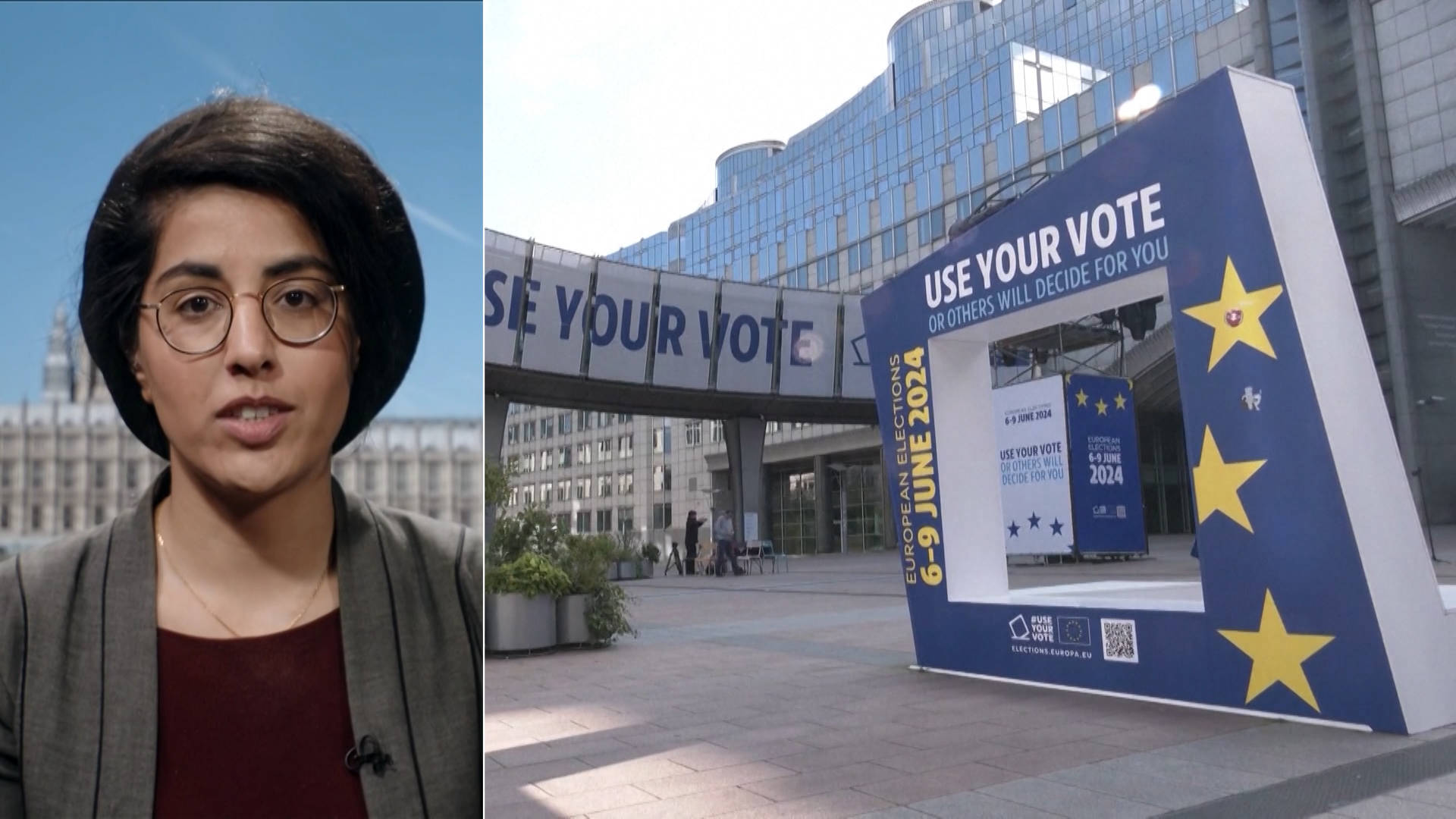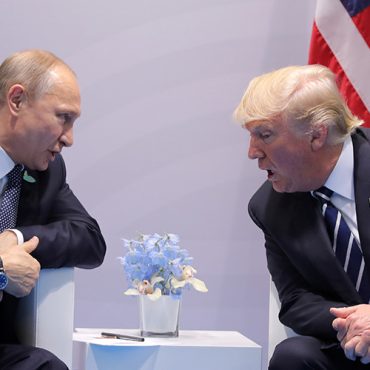This is a rush transcript. Copy may not be in its final form.
AMY GOODMAN: In Europe, residents of 27 countries went to the polls this weekend for the European Union’s parliamentary elections. With nearly 400 million eligible voters, the EU elections are among the world’s biggest democratic polls, which are held every five years. This year’s results ended in a strong showing for the far right across much of the European Union, while many liberals and Green parties stumbled. Most of the far-right gains were concentrated in countries that elect a large number of seats to the EU Parliament: France, Italy and Germany.
Incoming lawmakers can veto and shape laws, though they cannot introduce them. They also set the EU’s budget and approve the selection of the European Commission president, a powerful role currently held by Ursula von der Leyen of the center-right European People’s Party. And despite the far-right surge across much of the EU, the European People’s Party was the biggest single winner on Sunday, remaining the strongest group in the European Parliament. On Monday, EU chief Ursula von der Leyen spoke in Berlin about the vote.
URSULA VON DER LEYEN: [translated] This election on European soil had two basic messages. Firstly, there is still a majority in favor of a strong Europe in the center of the political spectrum. In other words, the center has held. But it is also true that the extremes on the left and on the right have gained support. And that is why this result is also associated with a great responsibility for the parties in the center.
AMY GOODMAN: The election results triggered a political earthquake in France, where Marine Le Pen’s far-right National Rally party won 30% of the vote, more than double President Emmanuel Macron’s Renaissance party. In a surprise move, President Macron responded by dissolving the French Parliament and calling for snap legislative elections in France, which will be held in three weeks.
In Belgium, the prime minister resigned after his party suffered heavy losses.
In Germany, Chancellor Olaf Scholz’s Social Democratic Party suffered a crushing defeat, coming in third behind the far-right Alternative for Germany, which scored its best results in history with 16% of the vote.
In Italy, Prime Minister Giorgia Meloni’s far-right Brothers of Italy party surged to first place in Italy, getting nearly 30% of the vote.
In Austria, the far-right Freedom Party was also forecast to finish first.
For more, we go to London to speak with Mehreen Khan. She’s the economics editor at The Times in London and a former Brussels and EU correspondent for the Financial Times.
Welcome to Democracy Now!, Mehreen. It’s great to have you with us. Can you just talk, start off with the overall trend in Europe, and then specifically talk about what’s happened in France?
MEHREEN KHAN: Sure. Thank you so much for having me on the show, Amy. I’m a big fan.
So, as you’ve already mentioned, there have been two major consequences from these elections. One is a move, a drift towards the far right in the competition of the European Parliament, and then this very unexpected political and potentially constitutional crisis in France.
To start off with the sort of European landscape, I think it’s worth stressing to the listeners and to the audience that having huge surges of one party is quite difficult in the European Parliament, because you have 27 elections, which are often run on domestic agendas in 27 different countries, which are all at different points in their political cycle. But what we can say is that the two biggest member states of the European Union, in France and Germany, there has been a clear shift towards the right. And that’s the far right in terms of the AfD, a party which used to be based around Eurosceptic and anti-Euro ideals but has moved definitively towards anti-migration, anti-Islam, sort of classic populist, nativist culture wars in Germany. And similarly, the same has happened among Marine Le Pen with her Front National party, now known as the Rassemblement National. So, they’ve had a rebranding in recent years to make them seem, I think, a bit more political palatable to French voters.
I think, on the European scale, immediately nothing will change. And that’s because it’s very hard in aggregate to get huge swings towards one part of the political spectrum. There is a sort of received wisdom that the center has held, and that’s because the three main parties who made the coalition that supported Ursula von der Leyen in 2019 are still likely to have a majority. But I think looking at the aggregate actually ignores what’s going on at a slightly deeper level and, I think, more substantive level, where the center-right parties, the Christian democrat parties of Europe, led by the likes of the CDU in Germany, have definitely moved towards the space that was occupied by the far right. There’s been a clear rightward drift on climate policies, so backlash against green activism, a clear move towards stronger anti-immigration policies and a rhetoric around culture wars, around Christianity, around Israel, around foreign policy, the role of European civilization, which means that these formerly center-right parties are now definitely occupying territory that we used to call that of the far right. So, in that sense, the incremental shift of European Parliament towards the right is not just because of the insurgent far right, but also because of the mainstream parties.
And then, if we move on to France, I think this is the most unexpected political earthquake to have come from any European elections to have ever held since 1979, which is that they’ve basically created a domestic political crisis in one of European Union’s most important countries, France. And Emmanuel Macron looked at the results and decided that he wanted to confront the far right, in quite a binary way, holding an election where most of his rivals have very little time to prepare, to mobilize or to organize. And his bet seems to be that if French voters are given a choice, a very clear choice between his party and Marine Le Pen’s far right, that they will choose him. And even if they don’t, the possibility of having a far-right prime minister for the next couple of years, before the more important presidential election in 2027, he thinks that they will do such a bad job in office that it will become clear to French voters by 2027 that this is a party that is not fit for governance, and this is a party of incompetent, unprofessional cadres, and they are not ready to run France, and, therefore, consolidate his own power base.
JUAN GONZÁLEZ: And, Mehreen Khan, I wanted to ask you, in terms of the vote, the rise especially of the far-right parties, to what degree the battle over immigration and migrants from the Global South, very much like the United States, where immigration has become a huge issue in the current presidential race — to what degree do you see the potential for these extreme-right parties to continue to grow as they try to mobilize their populations against the migrants coming in?
MEHREEN KHAN: Well, I think there is a clear parallel with the United States. And I would say that parallel is that rather than being a contested area, migration is an area which there is huge amounts of consensus, from the left, the right and the far right, that Europe is a continent that is closed, whose borders are closed. I think the push towards having anti-immigration policies or tough immigration policies that stop people, as you’ve already mentioned, from the Global South coming in — this also includes laws around refugees and asylum seekers — the European Union has probably decided since 2015 that it is a continent that does not want these people in its countries. So, in that sense, the far right has won that argument, because it’s become a mainstream consensus.
I think the areas where the far right has shown a bit more political innovation is moving onto territories like climate change, so creating a culture war around the green transition, saying that this is expensive for ordinary people, that — you know, even bordering sometimes on climate denialism. And again, if we think about the United States, there’s another parallel, and I think the far-right parties in Europe really do take a lot of cues from Donald Trump’s Republican Party. And they’ve definitely moved into more of the social sphere, so speaking about Europe in civilizational terms, in racial terms and in religious terms. And this is where I think the far right probably is finding more appeal among voters, a kind of emotional and identitarian appeal, which does include migration but is definitely broadening out from just being a one-issue subject for the far right. They seem to be a movement, at least, that wants to encompass all areas of policy, from foreign policy, economic policy and also social and cultural policy.
JUAN GONZÁLEZ: And how do you assess the failures of the left parties in Europe to gain ground? I mean, there were some which did, but for the most part, they did not.
MEHREEN KHAN: It’s difficult to assess it on an aggregate level. But if we think about some small pockets, there have been surprise successes in the Netherlands, where the Greens and the Socials — and the Social Democrats, the traditional left, actually teamed up, and they did well. They became the first party in the Netherlands, second to the far-right party of Geert Wilders.
But, generally, the left has struggled to find a message, and, in particular, an economic message for populations in Europe that have basically seen stagnant wage growth, a cost-of-living crisis, very high energy prices. And I think, crucially, they have also failed to get that sort of emotional appeal, something that the far right seem to do far better, creating narratives around identity, around people’s place in their member states, in their countries, their relationships to their governments and to each other.
It’s worth noting that if the U.K. had been a member state in the European Union — this is the first time that Britain was not participating in the European election — the left would have done pretty well, because Labour probably would have had a stonking huge vote swing in their favor. And then we would probably be talking about a social democrat grouping in the European Parliament that was close to the biggest, the EPP. So, there are lots of variables involved.
But I think you’re right that, generally, the left has failed to beat the far right, because they’ve been outflanked on so many areas, including traditional strengths which they would have seen, like creating social and economic justice and providing a sense of inclusivity and diversity. These messages have either not been pushed far enough in countries like France or have been seen to be, you know, too beyond the pale for, I think, a population in many Western European countries where there is just a very general and long-term trend towards the right.
AMY GOODMAN: Mehreen Khan, for people, especially in the United States, who may not really understand the way Europe works with the European Parliament, if you can explain its role, its power, how significant it is, and also, back in France, who Marine Le Pen is?
MEHREEN KHAN: Sure. The European Parliament is one of the three major bodies of the European Union. Its executive is called the European Commission. Then there is a collection of the member states, so the heads of all the 27 governments, known as the European Council. And then there is the European Parliament, which is supposed to be the democratic hub of the European Union. They have the ability to veto legislation, which is proposed by the European Commission. They also negotiate on legislation.
Generally, the European Parliament has been held together by a grand coalition, a coalition between the center-left and the center-right, that has persisted all the way through the Parliament until 2019, when liberals had to be brought in to support the coalition. We think the liberals and the Greens are also going to be brought in to support a coalition behind the president of the European Commission. And it’s very important for her — we think it’s going to be Ursula von der Leyen again — to have this support, because it means that — having a majority means that she can pass proposed legislation through the Parliament, even after, you know, there have been tweaks made.
The European Parliament, however, is seen to be probably the weakest of those three institutions that I’ve already mentioned. That’s because they’re usually divided. It’s quite difficult to mobilize the European Parliament as a singular force, because it’s becoming much more fractured. And we know that now, because we have a far left and increasingly large far right, who will try and disrupt the process of legislation in the European Union.
And if we’re thinking about France, for your listeners in the U.S., I’m trying to think of a parallel to Marine Le Pen in the U.S. I don’t think there is a clear one. But she has been the face, and, I think, the acceptable face, of the far right in France for about 10 years. She took over a party called the Front National from her father, which, when he was in charge, Jean-Marie Le Pen, it was a far more antisemitic, far more overtly racist party. It’s been the job of Marine Le Pen to create a softer image around the Front National. However, they’re still considered to be the far right. Despite dropping, I think, some of the antisemitism, they’ve definitely been moving into areas like Islamophobia. They are an incredibly anti-Muslim party. They speak, and Marine Le Pen has said, that the sight of Muslims praying on the streets was the equivalent to the Nazi occupation of France in the 1930s. This is still a party that is considered to be beyond the pale, or had been considered to be beyond the pale by mainstream parties. But as we’re probably going to see in the next three weeks, there is now a chance, for the first time in French history, that the Parliament and the prime minister will be from the far-right party. And this is a prelude to the potential of having a far-right French president in 2027.
AMY GOODMAN: Finally — we just have 30 seconds, Mehreen — the role of Israel’s war on Gaza in these various elections?
MEHREEN KHAN: The European Union countries are usually split on the issue of Israel. And often that’s not a partisan thing. It’s about historical ties towards Palestine. One thing that I will note is — we don’t have too much time — is that before these elections, there was a lot of talk and discourse around Brussels that Vladimir Putin would be very happy if there was a far-right insurgency in Europe. We haven’t heard too much from Putin, but what we have heard is that the Israeli government, led by Benjamin Netanyahu, has already expressed that they are very happy with this outcome of a far-right insurgency, because they think this will protect Israel from criticism among European Union member states. And I think that is a pretty decent bet on his part. I think that is true. I think criticism of Israel will become much more difficult in the European Union, because far-right parties are very closely aligned to what they think of their spiritual partner in Israel, and particularly the figure of Benjamin Netanyahu.
AMY GOODMAN: Mehreen Khan, we want to thank you so much for being with us, now economics editor at The Times of London, former Brussels and EU correspondent for the Financial Times.
Next up, we speak to Dr. James Smith. He’s in Istanbul today. He’s an emergency medical doctor who just left Gaza after two months. Back in 20 seconds.











Post comments (0)